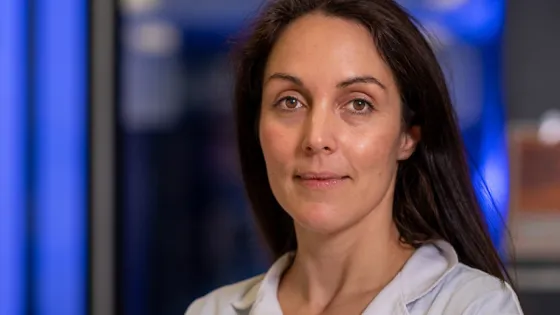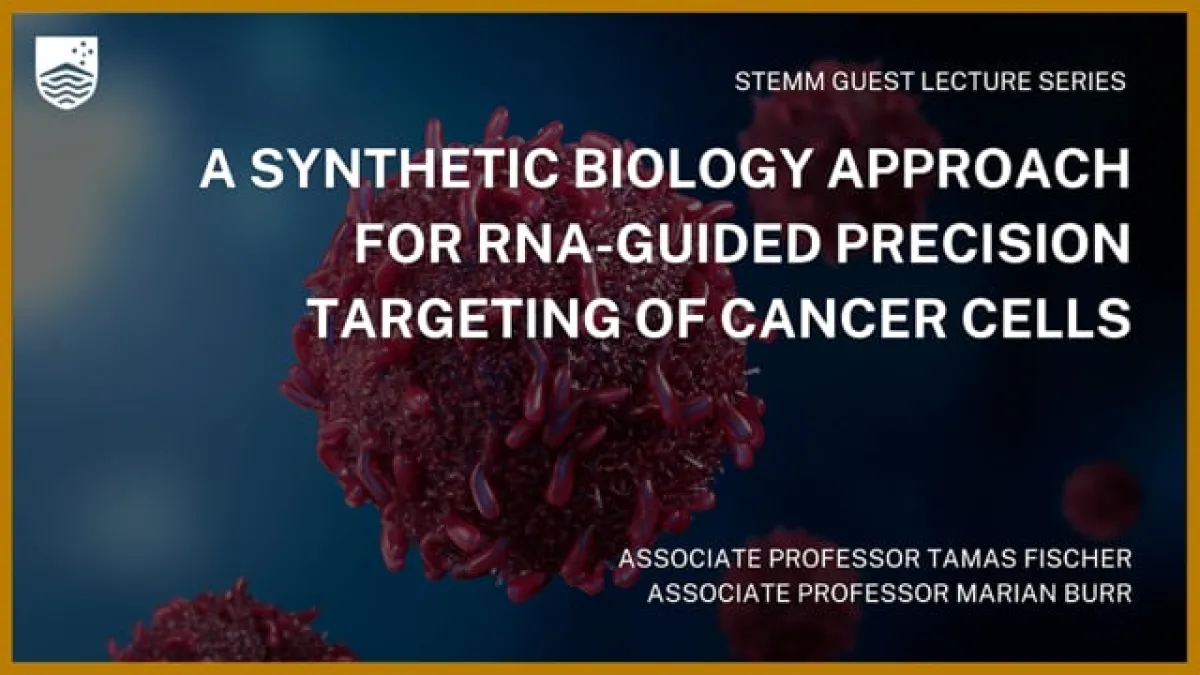
A synthetic biology approach for RNA-guided precision targeting of cancer cells.
Imagine a world where we can treat cancer with pinpoint accuracy, targeting only the cancer cells and leaving healthy cells untouched. Presented by Associate Professor Tamas Fischer & Associate Professor Marian Burr.
Speakers
Event series
Content navigation
RegisterDescription
Imagine a world where we can treat cancer with pinpoint accuracy, targeting only the cancer cells and leaving healthy cells untouched. One of the biggest challenges in cancer treatment is doing just that- hitting the bad cells without damaging the good ones. Side effects from harming healthy cells often limit our treatment options, making it harder to fully wipe out tumours. But what if we could change that? We’re developing a groundbreaking molecular tool that’s customisable for each patient. This tool homes in on specific RNA sequences that are unique to cancer cells. When it finds its target, it triggers powerful actions like killing the cancer cells or activating the immune system, all while leaving healthy cells alone. If the target isn’t there, the tool stays dormant and safely exits the cell without causing any harm. This innovative approach could revolutionise cancer treatment by allowing us to target cancer cells with unprecedented precision, tailored to each individual. Our project is a collaboration of experts in RNA biology, cancer immunology, and synthetic biology, all working together to create a new, personalised way to treat cancer.
About the speakers
Tamas Fischer

Associate Professor·John Curtin School of Medical Research | ANU College of Health & Medicine
Tamás Fischer is an Associate Professor at The John Curtin School of Medical Research (JCSMR) at The Australian National University. He completed his PhD studies in 2005 at the University of Heidelberg, Germany, working on the nuclear export of mRNA and its coupling to transcription. Following his PhD, he was awarded a postdoctoral fellowship in epigenetics and chromatin biology at the National Cancer Institute (NCI, NIH) in the USA. He returned to Germany in 2010 to establish his own independent research group at the University of Heidelberg Biochemistry Center. He has recently moved his laboratory to Canberra, Australia to join the Department of Genome Sciences at JCSMR
Marian Burr

Associate Professor·The John Curtin School of Medical Research | ANU College of Health & Medicine
Associate Professor Burr completed a PhD in immunology at the University of Cambridge in 2014, where she identified novel cellular quality control pathways regulating MHC class I antigen presentation. Clinical specialty training in anatomical pathology inspired her to apply this expertise to tackle the problem of immune evasion in cancer. Supported by a prestigious Cancer Research UK Clinician Scientist Fellowship, she established a highly productive research program in Cambridge and subsequently at the Peter MacCallum Cancer Centre, making fundamental biological discoveries that hold great promise for the development of novel cancer immunotherapies. In 2017, her team identified the previously uncharacterised protein CMTM6 to be a binding partner and regulator of PD-L1 in cancer cells (Burr et al, Nature 2017), a landmark discovery that has opened a new field of research and led to the establishment of drug-discovery programs in Australia and world-wide to develop immunotherapies targeting the CMTM6-PD-L1 interaction. Her recent work has identified distinct epigenetic repressive complexes silencing MHC class I antigen presentation in cancer cells (Burr et al, Cancer Cell 2019), uncovering new opportunities for the targeted use of epigenetic inhibitors to improve anti-tumour immune responses in a number of aggressive, difficult to treat malignancies such as neuroblastoma and lung cancer.
Location
Online

